Pro soccer in Central Kentucky ‘a win for everybody’ if owner’s long-term vision kicks in
Bill Shively can confidently recount the common threads that tie together the business ventures that have occupied his adult life.
From success in Florida with the Tower Hill Insurance agency that was initially founded by his father, to producing several blockbuster movies and then purchasing and renovating Dixiana Farm in Lexington, Shively cites relationships and risk assessment as the two common denominators underscoring his interests and passions.
“I’m a probability and statistics guy. I’m a risk evaluator,” Shively told the Herald-Leader in early March. “That’s the best way to describe risk, right?”
These sentiments have held true for Shively’s latest venture, one that’s already reshaped the professional and youth sports landscape in Central Kentucky.
Shively is the majority owner of Lexington Sporting Club, the new professional soccer franchise that has begun play in USL League One, the third tier of American men’s pro soccer.
Lexington Sporting Club — which is also referred to as Lexington SC or LSC — also boasts a wide array of pre-professional men’s and women’s teams and youth boys’ and girls’ teams.
It’s that piece of LSC, the direct community involvement that comes with hundreds of children participating in the club’s youth setup, that appeals most to Shively.
“It was as simple as my kids liked it. So I put up a full set of goals. And I had a field to the left of the house. What I always thought was the right answer was, if you had a soccer pitch, all the kids came to your house. I loved that part,” said Shively, who also coached his children in soccer during their middle childhood years.
“There’s two soccer pitches on my farm here. One big one. One small one. So yeah, it was simple as that.”
It’s one thing to acquire an interest in a sport because of a child’s participation in it. It’s another to become the main monetary presence behind the establishment of a professional team in an unheralded soccer market.
So why did the 72-year-old Shively take the step of bringing Lexington Sporting Club into existence, and what does he aspire the club to accomplish?
“I think this sports team could be more of my legacy than really any of the other businesses,” Shively said. “I mean, the insurance company will move on in the next generation. I think it’ll be around for a long, long time. But when you start building fields and stadiums and things like that, that lasts a lot longer.”
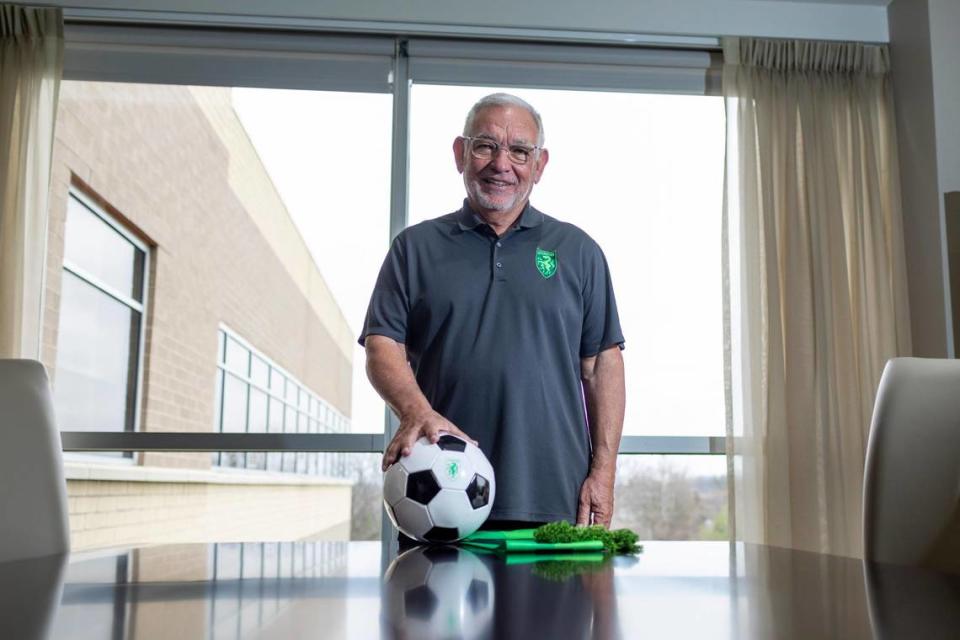
Why soccer, why here and what about that stadium?
Shively’s first exposure to soccer came in the same way it did for many Americans: the 1994 FIFA Men’s World Cup that was hosted by the United States.
Shively went to matches played at the Citrus Bowl in Orlando, a venue that hosted three games alone for a Netherlands team that featured legendary players like Dennis Bergkamp and Frank de Boer.
Shively’s interest in soccer continued through Tower Hill Insurance, which Shively said sponsored up to 300 youth soccer teams in Florida.
Then, his interest in the sport fell off around the time he began in the movie production business: Shively is credited as a producer on several major-budget films, including the 2004 sci-fi thriller “The Butterfly Effect.”
A renewed interest came when Shively purchased Dixiana Farm in Lexington in 2004, along with his wife, Donna. Upon purchasing the farm, Shively had a soccer pitch built for farm workers, which eventually led to the establishment of an annual soccer tournament at Dixiana featuring teams from different horse farms.
Shively probably didn’t know it at the time, but several of the values that made Lexington an appealing option to receive a USL League One expansion franchise were already on display when he chose to build that pitch.
“What struck me here was culturally, we’re much more suited to soccer than a lot of places,” Shively said. “I mean, we have a large Hispanic population. We have a lot of Irish, European, English horse people. I mean, if you look at my farm, I have them all. They love their soccer. I mean, they really love their soccer.”
But even after describing these elements of a potentially fertile soccer landscape, Shively pivoted back to the core reason why professional soccer has arrived in Lexington.
“I would say what got me into it more was this generation of kids.”
Shively recounted several instances of soccer involvement among his seven children, but one that’s striking a chord now is his 13-year-old son.
Shively describes a soccer-obsessed teenager in a way that many parents across the U.S. can relate to: Shively said his son, a fan of German club Borussia Dortmund, can name every player in the English Premier League and every player in the German Bundesliga.
Another shared experience between Shively and other soccer parents? An annoyance at having to travel on weekends to compete in tournaments.
So, Shively decided he wanted to bring things closer to home.
In September, LSC got the go-ahead to build youth soccer fields at Athens-Boonesboro Road near Interstate 75. The facility is scheduled to be completed by the end of the spring.
The club is also pursuing a 6,500-seat stadium and a training and medical complex next to the fields, although Shively was non-committal to the Herald-Leader about going through with the proposed stadium at the Athens-Boonesboro Road location.
“It’s going to be difficult to build at Athens. It’s not a commitment right now that we can make. There are places that are extremely interested in having us,” Shively said, while acknowledging both that the Athens-Boonesboro Road site wasn’t his first choice for a stadium, but also the benefits that would come with having all LSC facilities at the same location.
“I would expect within the next six months we’ll have a firm commitment and be in a position to start the (stadium-building) process. ... We continue to meet with Lexington. We continue to meet with other places. Whatever it is, we want to do it right. We want it to be someplace that you want to go and take your kids.”
LSC’s first test in this vein will come Saturday night, April 8, when the club’s first home match is played at Toyota Stadium in Georgetown against Forward Madison FC.
Last month, LSC announced a a multi-year partnership with Georgetown College for the use of Toyota Stadium, which will be LSC’s temporary home venue while the club builds its own stadium.
During his nearly hour-long interview with the Herald-Leader, Shively repeatedly spoke about how welcomed he and the club felt during conversations with Georgetown College to use Toyota Stadium, which is being outfitted with new artificial turf prior to the home opener.
Shively said the deal to use Toyota Stadium was completed after just two weeks of negotiations.
“They welcomed what we could bring to the community, not just, ‘Hey, do you want to play in our stadium?’” Shively said. “We’re something that’s relatively inexpensive, comparatively, to doing a lot of the other things you can do. We’re hoping that the family of four will come and have a good time.”
Shively told the Herald-Leader that Lexington SC structured a five-year deal with Georgetown College, and that LSC may be there “several years” based on the timeline for construction of LSC’s own stadium.

Louisville City a nearby example for LSC
Shively is using the same long-term principles he’s applied in the insurance, movie and horse industries to his newest venture in professional sports.
“I like to see things grow. I thought this was a very fertile place for soccer. I think we have pretty good talent, and we have people interested in it,” Shively said, noting the success of nearby Louisville City FC in the USL Championship (one division higher than LSC) and FC Cincinnati in MLS (two divisions higher).
“I respect that they’ve turned family entertainment into something. ... The fans have a good time. I think we could use more family entertainment. I think there’s room for us in doing this here.”
Lexington’s proximity to Cincinnati (about 80 miles) and Louisville (about 73 miles) has provided LSC with regional examples of how to generate fan interest, along with on-field success.
Louisville City has been the most dominant club in the USL Championship since its inaugural season in 2017, and opened a soccer-specific 11,600-seat stadium in 2020.
FC Cincinnati also played in the USL from 2016 to 2018, before strong attendance numbers, a persuasive pitch and the promise of a now-built soccer-specific stadium helped the club move to MLS in 2019.
Shively told the Herald-Leader he had meetings about potentially investing in Louisville City before LSC became a reality.
Both Louisville City (John Neace) and FC Cincinnati (Carl Lindner III) also have prominent front office figures with ties to the insurance industry.
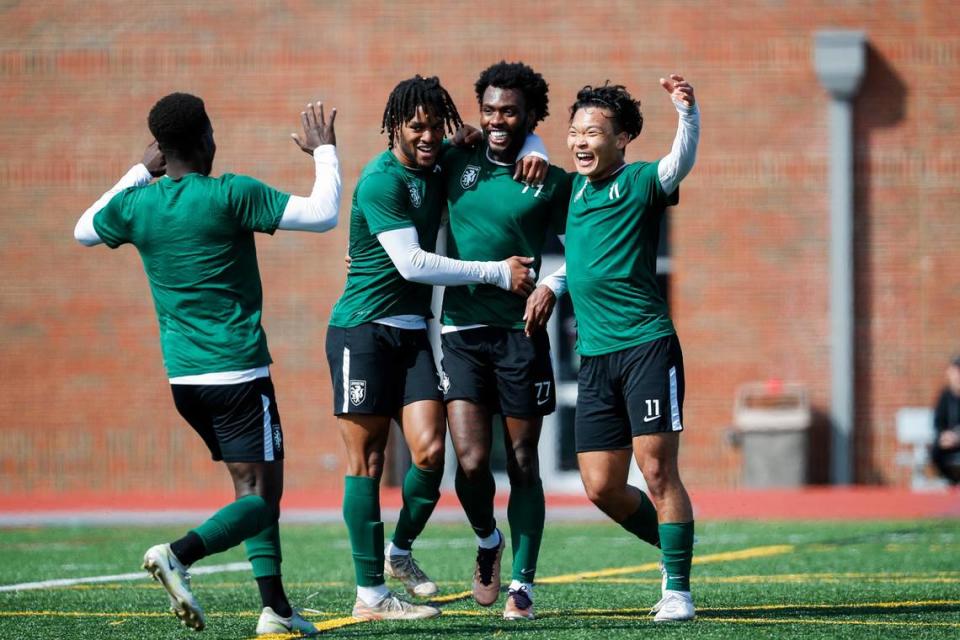
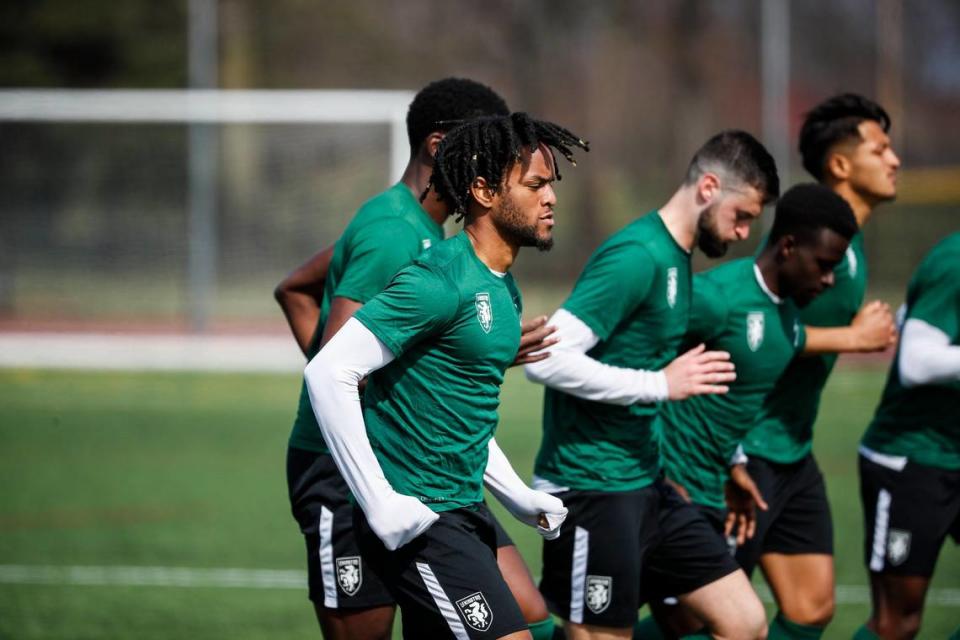
“If you look at Lexington, I get UK, I get U of L, I get Keeneland, I get Churchill Downs. All of those things can co-exist alongside of pro sports,” Neace, who serves as Louisville City’s Chairman and CEO, told the Herald-Leader in September. “If you really look at this the right way: Pro sports going into Louisville, pro sports going into Lexington, will provide a pathway for some kids wanting to become professional athletes.”
Lou City has offered several recent examples of a farm-to-table pipeline that has seen homegrown talent go from the club to elite levels. Former Lou City defender Jonathan Gómez went from Louisville to Spanish top-division club Real Sociedad in 2021, and has already represented the United States Men’s National Team.
While Lou City failed to profit in a significant way from the Gómez transfer due to a rarely seen clause in his contract, that probably won’t be the case this summer when the club is expected to move another young star, defender Josh Wynder, to a European club for more than $1 million.
“I think we can compete in our league. But it’s not this year. It’s where are we five years from now, and how does that look?” Shively said. “I hope we look a lot like Lou City. I mean, I hate to say we have a role model 60 miles away, but they are a good organization running a good operation.”
Something that Shively thinks will work in LSC’s favor? A dearth of professional sports in the region, and a lack of direct overlap between the existing sports options offered by the University of Kentucky, Keeneland and the recently renamed Lexington Counter Clocks minor league baseball team.
“We don’t have a lot of competition here. There’s not a lot of pro sports. ... But minor league pro sports, I think there’s room for it here. Especially if we can make the games fun, enjoyable for families,” Shively said. “We’re challenged with, how do we put that all together as quickly as possible?”
“It doesn’t inhibit or detract from Keeneland or the University of Kentucky or anything else,” Neace added. “Those people that are on the fence, let’s get them liking one or the other because the money they spend is a win for everybody. The jobs that are created are a win for everybody.”
Something yet to be seen is how much the on-field product will play into this.
2023 marks the fifth season of USL League One. A different club has won the league — which currently features 12 teams with the top six clubs qualifying for the playoffs — in all four prior editions.
“That’s a good question,” Shively said when asked how much winning will factor into what LSC becomes. “I guess I’m so committed to winning that I hope I don’t have to find out what happens if we’re not a good team. I think we’ll be a good team. I’m pretty sure.”
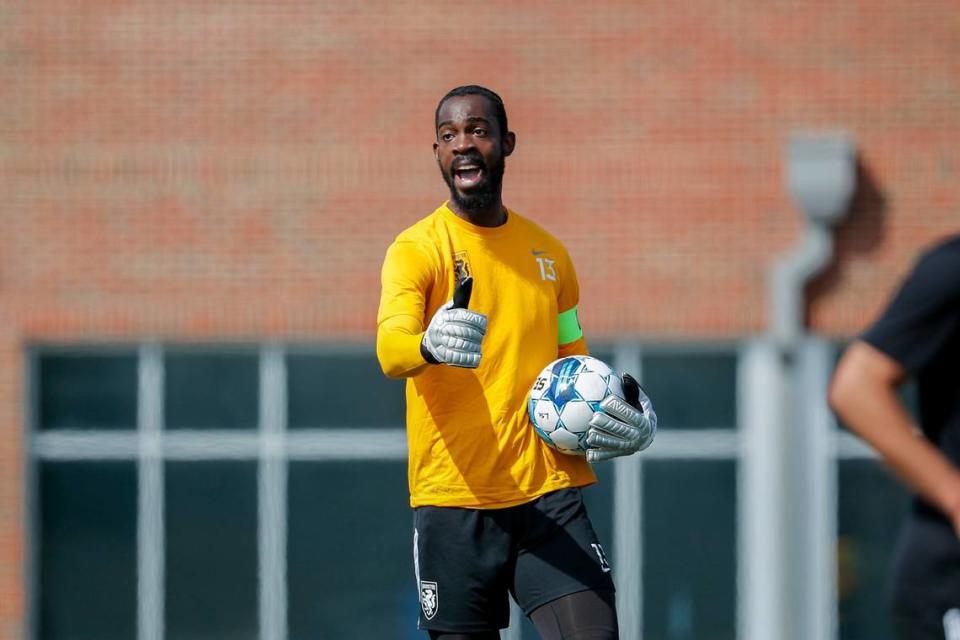
What does Shively want for LSC?
So what is Shively’s end game with Lexington Sporting Club?
What does a man who thinks in five- and 10-year plans want LSC to be when those benchmarks arrive?
“I think, obviously, we would love to be in the (USL) Championship in the next five years. We would like to have a really winning team. That’s the thing about sports, it’s measured by winning,” Shively said. “I’d love to have a sellout stadium like Louisville City, 10,000 or more. But more than anything, the legacy I expect to leave is that kids who come up through our system are going to be playing in the MLS, and maybe the Premier League.”
“The ultimate success is not just winning and having a nice day in the (USL) Championship. But what if we train kids, from the time they’re 8, and now they’re playing for Chelsea? That would be the big win.”
This emphasis on Lexington SC’s youth setup and providing a pathway for local players to reach the professional level, without leaving home, particularly resonates with Sam Stockley, LSC’s USL League One head coach and men’s sporting director.
“They (the LSC ownership group) truly believe that we can have such a big impact on the future generations by providing opportunities in a safe environment, where they can learn to play the game in a team sport and learn lots of life lessons through team sport,” Stockley told the Herald-Leader. “I was one of those products at 8, 9, 10 years old that came through that system. I came from a broken home, my dad wasn’t around. ... I didn’t have to pay for football. But if I did, I probably would never have had the chance because my mom couldn’t afford it at the time.
“The money that’s going into this project to make it a success for the club and for the community, it’s who (LSC ownership) are, it’s what they’re about,” Stockley added. “It’s multi-, multi-, multi-millions of dollars that are going into this that they’re prepared to do and they want to do because they truly believe in the project and feel like this is the right thing for the city.”
Shively understands — and appears encouraged — by the prospect of having far-reaching goals, with decisions and determinations that aren’t revealed to be wins or losses until well into the future.
But the way he ultimately crystallized what Lexington Sporting Club can be centered around community, and the creation of something that could benefit generations.
“If you think about it for your kids, your grandkids down the road, to say that, ‘Hey, that soccer part, we did that.’ I moved to a small community in Florida, and my first house was a single-wide mobile home in a retirement community and the softball field is Shively field. That’s 40 years ago,” Shively said.
“We don’t want any Shively Fields. That’s not the point. But the point is, to me (this) could be really good for the town, the city. If people 20 years from now will look back and go, ‘What they did really helped. What they did has been a good thing.’”
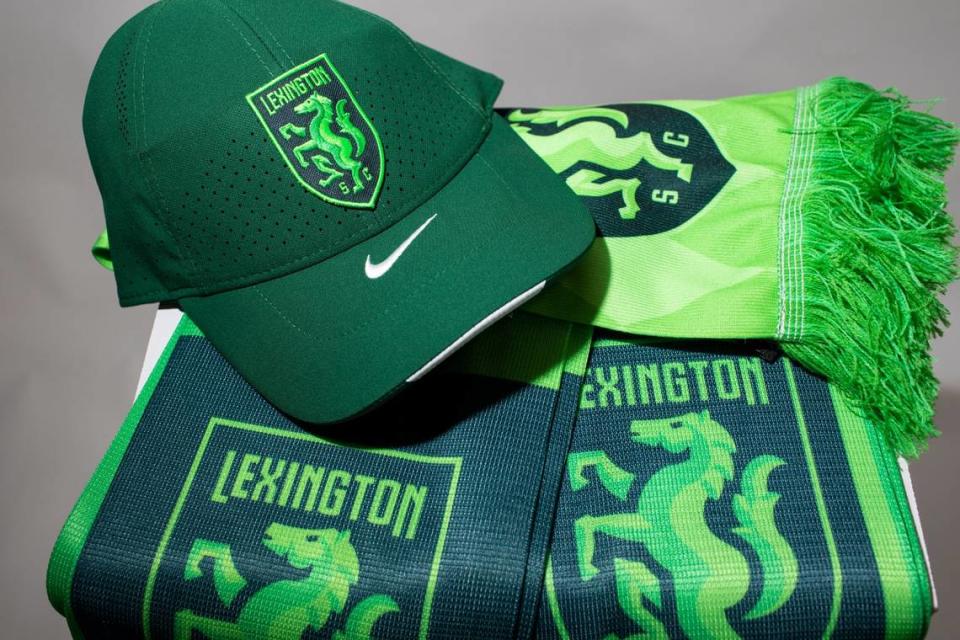
Home opener
Lexington Sporting Club vs. Forward Madison FC
When: 7 p.m., Saturday, April 8
Where: Toyota Stadium (Georgetown)
Tickets: https://www.lexsporting.com/tickets
Watch: ESPN Plus
History: First-ever meeting between the teams
Where to watch, how to follow Lexington Sporting Club during inaugural USL League One season
What will define a successful first year for the Lexington Sporting Club?
Meet every player on Lexington Sporting Club’s inaugural roster for USL League One season
Who will Lexington SC play this season? What to know about other USL League One teams.
Q and A: Sam Stockley discusses present and future aspirations for Lexington Sporting Club
Sam Stockley: Lexington Sporting Club aiming to win on field and in community
‘Big on doing things right.’ What will game-day experience be like for Lexington SC?
‘We’re going to embrace it.’ Lexington Sporting Club plays Louisville City for first time.
A timeline of professional sports in Lexington over the past five decades
Lexington Sporting Club reveals road jerseys ahead of debut season in USL League One
Lexington Sporting Club takes the pitch for its first USL League One match. How did it go?

